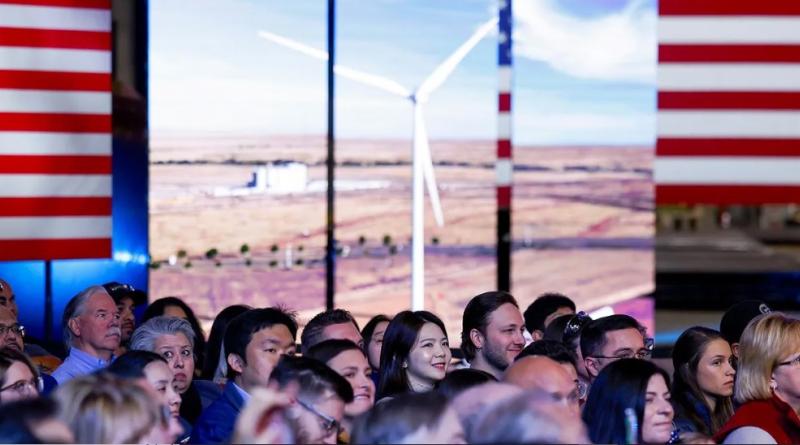Nine breakthroughs for climate and nature in 2023 you may have missed

Record-setting spending on clean energy in the US. A clean energy milestone in the world's power sector. A surge in lawsuits against polluters. A treaty for the oceans 40 years in the making.
This year has seen some remarkable steps forward in tackling the nature and climate crises.
But in a year like 2023, it's natural our attention has been drawn to the environmental disasters that have dominated the headlines. Add to that our "negativity bias", which affects the information we are most drawn to, and you can see why any positive developments over the past 12 months feel very quiet by comparison.
Some breakthroughs also don't get shouted about because they are being led by grassroots communities or indigenous groups whose voices are often marginalised. And sometimes, as we'll see, a climate win is quiet for a reason.
This is why we've gathered some of the "quiet wins" of 2023 for the climate and nature, to make sure these breakthroughs don't escape our attention.
Here are nine positive developments worth your notice, plus one louder change:
1. A huge boost for clean energy
In the US, the green energy transition has received a massive boost from the Inflation Reduction Act. Passed in 2022, the bill includes $369bn (£294bn) for action to reduce greenhouse gas emissions, support clean energy and encourage electrification. It was quickly welcomed as the largest climate investment in US history, although it isn't at all obvious from the legislation's name – perhaps making it the definition of a "quiet" climate win.
"It doesn't sound as if it's dealing with climate change, but it does," says Sir David King, the UK's former climate envoy who worked with his US counterpart John Kerry on negotiations including the Paris Agreement. "Even today, the majority of Senate and Congress will not support direct action on climate change. Which, of course, is why [President Joe] Biden has put this [climate action] forward under his emergency act to deal with inflation, the IRA."
Since the package was passed last August, the private sector has announced more than $110bn (£88bn) in new clean energy manufacturing investments, including more than $70bn (£56bn) for electric vehicles, according to the administration. One analysis by a team of energy and sustainability researchers estimates that by 2035, the IRA's acceleration of green energy has the potential to reduce emissions across the US economy by 43-48% compared with 2005 levels. If so, this would bring the US significantly closer to its climate goals.
The act could also help fund growing efforts among Native American communities to generate renewable energy on tribal lands.
Read more about how Native American tribes are embracing renewables.
2. A turning point in power emissions
The world was set on a track for emissions from the power sector to peak in 2023. Energy from renewables like wind and solar grew faster than the world's power demand did, which means emissions from the sector were predicted to edge downwards for the first time.
It's a welcome milestone that doesn't just look good on paper – it's an important positive tipping point for climate change, according to the authors who made the prediction in April. "This marks the point where power sector emissions stop rising," wrote Małgorzata Wiatros-Motyka, senior electricity analyst at the London-based think tank Ember, and her colleagues.
Like any tipping point, it's after the peak that the real momentum comes, as Simon Sharpe, author of Five Times Faster: Rethinking the Science, Economics, and Diplomacy of Climate Change, told the BBC at the time.
"When that actually happens, it's the first major global emitting sector to go into emissions reduction instead of growth," Sharpe says. "I think there's a good chance that this could be a tipping point in our political and social confidence, that we can actually get a grip on this problem."
In a mid-year update, Ember found that emissions from the power sector had reached a tantalising plateau – so the picture for power emissions still hangs in the balance.
Read the full story on why positive tipping points matter for climate change.
3. Plastics manufacturers sued for pollution
An estimated 460 million tonnes of plastic waste is produced globally each year, with around 22% of that waste released into uncontrolled dumpsites, burned in open pits or released into terrestrial or aquatic environments. Now, a backlash against single-use plastics is growing.
In 2022, the United Nations Environment Assembly began negotiating a Global Plastics Treaty to address global plastic pollution with aims to have it in place by the end of 2024 – with little progress made so far. However, new legal pathways are allowing people to take matters into their own hands and sue plastics manufacturers for damages.
And while this is primarily a pollution issue, the plastics industry also contributes 3.3% of the world's greenhouse gas emissions – comparable to emissions from aviation – and 6% of the world's electricity from coal is used to make plastics.
Earlier in 2023, Danone, the company behind brands such as Evian, Activia and Volvic was taken to court by three environmental groups. "We are very surprised by this accusation, which we strongly refute," Danone said in a statement at the time. The firm says it is taking comprehensive action to reduce the use of plastic, developing reuse, strengthening collection and recycling schemes, and developing alternative materials.
Meanwhile, New York state is suing PepsiCo for plastic pollution that is contaminating the water and harming wildlife in Buffalo River. PepsiCo, maker of Pepsi, Doritos and other snacks, is the world's second-biggest food company after industry leader Nestle. The BBC contacted PepsiCo for comment but received no response by the time of publication.
4. America's biggest dam removal
Dams along Oregon and California's Klamath River have greatly reduced salmon populations. After decades of campaigning, the first dam was demolished in November 2023 – one of three that will be removed over the years in the largest dam removal project in American history.
Tribes in the region are euphoric: the Yuroks and Karuks have been fighting for a free-flowing river to restore and heal the ecosystem, and strengthen their ancestral connections to the river, which they see as a lifeline.
"The removal of the Klamath dams is the single biggest step we can take to restore the river ecosystem and increase salmon numbers," says Barry McCovey, Yurok Fisheries department director. "The project will also make fish runs more resilient to climate change."
The chinook salmon is a sacred cultural food for the Yurok tribe, who depend on the fish for sustenance. In recent years, the tribe has cancelled their annual salmon festivals due to scarcity. Now the river is flowing free again, they're hopeful populations will bounce back.
Tribal members have been painstakingly collecting native plant seeds from the area to replant in the barren hillsides that will be exposed by the Klamath dam removal, which will be completed by the end of 2024.
Read about the long fight to dismantle the dam on the Klamath River.
5. A treaty to protect the high seas
After decades of negotiations, countries have finally agreed to a treaty to protect the world's oceans that lie outside national boundaries.
Until now, just 1% of these waters have been protected. The High Seas Treaty provides a framework for setting up marine protected areas, a crucial step to fulfil aims to protect 30% of the world's oceans by 2030.
"The ship has reached the shore," said Rena Lee, president of the Intergovernmental Conference on Marine Biodiversity of Areas Beyond National Jurisdiction, in her conclusion to the negotiations in March.
Read about what the high seas treaty means for deep sea mining.
6. The EU promises to become forest-friendly
The European Union is stopping imports of commodities and products linked to deforestation, in a move campaigners described as groundbreaking.
Under a new regulation that entered into force in June 2023, importers of commodities such as soy, beef, palm oil, wood, cocoa, coffee and rubber "must be able to prove that the products do not come from recently deforested land or have contributed to forest degradation", the European Commission said in a statement. This also includes products such as chocolate and furniture that are made from those commodities.
The EU was the second-biggest importer of products linked to deforestation after China, according to a WWF report published in 2021, and the bloc was responsible for 16% of deforestation linked to international trade.
"The EU deforestation [regulation] is the first of its kind and a groundbreaking step for the EU to try to scale back the destruction our consumption is causing," says Sini Eräjää, Greenpeace's EU forest campaigner. The regulation puts the burden on the big companies to show their supply chains are clean.
Eräjää says Greenpeace will be pushing for the regulation to be expanded to protect other natural areas beyond forests, such as savannahs and wetlands, and cover more products too, such as corn and poultry.
7. Deforestation of the Amazon slows
Other hopeful forest news came from Brazil, where the rate of deforestation in the Amazon rainforest dropped sharply, after Brazil's new government pledged to stop deforestation completely by 2030 and took steps including monitoring the forest for criminal activity such as illegal logging. In Colombia, the rate has also slowed sharply.
"[This is] very good news, and the hope is that this trend will continue in the coming years," says Marielos Peña-Claros, a professor in forest ecology and forest management at Wageningen University in the Netherlands, and co-chair of the Science Panel for the Amazon network.
One reason for the positive trend was that governments were returning to a strategy that successfully kept deforestation low between 2004 and 2012. This approach "includes not only monitoring and fines but also alternatives of production", she says.
Peña-Claros also welcomed initiatives by Amazonian countries to collaborate regionally, highlighting efforts to jointly track, map and stop deforestation through projects such as the MapBiomas project, which gathers and presents data on land use change.
Read about how investors can help save the Amazon.
8. Upholding indigenous rights in Brazil
In another win for indigenous communities and the environment, Brazil upheld indigenous people's rights to their ancestral land in a landmark ruling.
The Xokleng people of the highlands of Santa Catarina state in southern Brazil had been evicted from their land, and the ruling restores their territory to them. It's thought that the case will set an important precedent for many more claims by indigenous groups within Brazil.
Separately, Brazil's president recognised six new indigenous reserves, banning mining and restricting commercial farming within them.
Watch as Brazil joyfully celebrates the ruling.
9. Climate cash for vulnerable countries
Nations suffering from frequent droughts and floods and facing the looming threat of rising sea levels have been calling for funding to help them cope with the impacts of climate change.
These countries haven't been calling quietly – they've been demanding support from rich nations for more than three decades. But rich countries have historically resisted these calls out of concern they could be held liable for all the climate damage they have caused.
In 2023, we began to see a shift in how calls are being heard. At COP28 in the UAE, world leaders finally agreed to launch the long-awaited fund for loss and damage caused by climate change. A long-overdue $100bn (£80bn) annual pledge to countries hit by climate impacts was also met for the first time this year.
Read more on how the very the first loss and damage funding is helping build safe homes in Bangladesh.
…and one loud promise to move away from fossil fuels
Though it certainly wasn't quiet, the final COP28 agreement, agreed by almost 200 countries, for the first time included a goal to move away from fossil fuels.
Nations such as the US, Australia and the EU bloc welcomed the deal as historic for deciding to transition away from fossil fuels. Small island states, vulnerable nations, and poorer countries said the language was not strong or urgent enough, and criticised a lack of detail on how rich countries could provide support in the transition.
President of the COP28 talks in Dubai, UAE, Sultan al Jaber said he thought the deal was enough to keep in sight the ambitious goal of limiting warming to 1.5C above preindustrial levels by the end of the century.
Whether he's right or not will depend on how the loose words of the agreement are translated into action.
To follow the progress, bookmark our homepage Future Planet and see how the world's most inspiring and impactful climate solutions play out in 2024.
--





